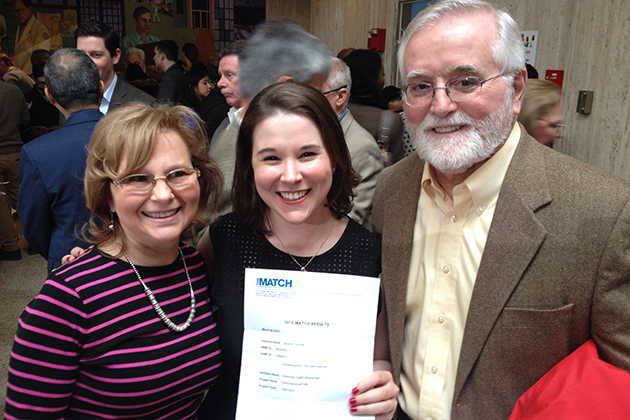
It’s nearly a perfect match for fourth-year medical and dental students at the University of Connecticut. Almost all of the soon-to-be graduates will be moving on to a residency program of their choice.
For the medical students, today was Match Day. The National Residency Match Program is held at the same time every year at medical schools across the country. When the clock struck noon in UConn Health’s academic lobby, 89 students opened an envelope and found out where they’ll spend the next few years doing in-depth training in their chosen specialty.

There was a lot to celebrate among the students and their families, as 98 percent of them matched to a residency program and 89 percent of them secured their top choice.
“The programs that they matched in are really impressive,” said Dr. David Henderson, associate dean of medical student affairs. “They matched in the more competitive programs in the country.”
Dr. Suzanne Rose, senior associate dean for education, told the students, “We are all so proud of you. We know how hard you’ve worked. It’s not an easy journey and you’ve done great. It’s really an extraordinary achievement that you’ve all accomplished.”
Meanwhile, 44 out of the 45 dental students graduating this year will be extending their career with a residency position – which is rare among graduates of dental schools nationwide.
“One thing that makes our Match Day results in the dental school so impressive and unusual is that all, or almost all, of our graduates, year-to-year apply for residency training of some type, spanning from one-year general dentistry programs to multi-year specialty training programs,” says R. Lamont MacNeil, dean of the UConn School of Dental Medicine. “Nationally, only 65 percent of dental graduates pursue residency training, with the remainder choosing instead to directly enter practice.”
MacNeil says typically there are not enough residency positions across the country to accommodate all graduates, so the competition is fierce for the limited positions that are available.
“The fact that our graduates successfully compete for these positions and often enter the most prestigious and in-demand programs in the country, speaks to the respect that others have for our graduates and the education that they receive here at UConn,” adds MacNeil.
Where they’re going
Most of UConn’s medical students, 54 percent, will be heading into primary care residency programs, which include internal medicine, family medicine and pediatrics.
Devorah Donnell will be doing her family medicine residency at her number one pick, Tufts-Cambridge Health Alliance in Boston. “I love primary care, it’s a big passion of mine. I’ve especially wanted to go to Boston because I’ve been working with an organization called Primary Care Progress based out of Boston, so it will be great being right there doing my residency. It is just the best of both worlds.”
Emergency medicine was the next most popular choice, with 10 students choosing that specialty, including Vishal Bhuva. “I matched my first choice, which is Cook County Hospital in Chicago,” he said. “I’m looking forward to a new adventure.”
Obstetrics and gynecology, psychiatry, and radiology were also top specialties.
The majority of the class, 67 students, will stay in the Northeast, and 21 of them will remain in Connecticut.
For the dental students, most (26) have chosen a general dentistry residency, while orthodontics, oral and maxillofacial surgery, and pediatric dentistry are other common specialties.
Claudia Odiaka will be staying at UConn – her first choice – for her pediatric residency.
“Having spent a lot of time shadowing at the program over the years, I know the faculty, staff, and current residents pretty well,” says Odiaka. “I’ve had tremendous support from all. UConn Dental feels like home.”
Odiaka is one of 14 students staying in Connecticut, while the rest will be spread across the country, from Seattle to Stony Brook.
Rita Flynn will be doing her residency in orthodontic dentistry at SUNY Stony Brook in New York. “I love to tinker with things, Flynn says. “I’m always the one putting together new furniture in our house, or finding a way to repair something instead of just buying a new one. Orthodontics allows me to use those skills, along with my knowledge of physics and mechanics and a little bit of biology, to figure out how to make someone’s mouth and teeth not only look better, but function better too.”



